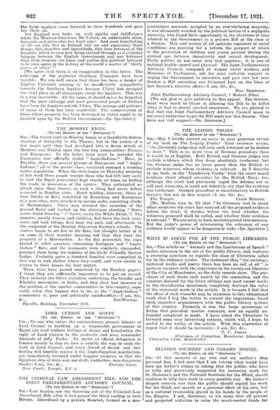THE LEIPZIG TRIALS.
[To THE EDITOR OF THE " SPECTATOR."] Sus,—May I briefly correct an error in your generous review of my book on The Leipzig Trials? Your reviewer writes, "the [German] judge may call only such witnesses as he desires' to hear." This is no more true of German procedure than it would be of. English. Both British and German judges can exclude evidence which they deem absolutely irrelevant, but the German judge has no more power than the British to exclude witnesses whose evidence is relevant. As I describe in my book, in the 'Llandovery. Castle' trial the court heard evidence about alleged atrocities by the British Navy, for, although the court had previously urged the defence not to call such witnesses, it could not definitely say that the evidence was irrelevant. German procedure is unsatisfactory to British lawyers, but not in this respect.—I am, Sir, &c., [Mr. Mullins says (p. 37) that "In Germany and in many other countries the court has received all the proposed evidence before the trial; it decides before the trial whether the witnesses proposed shall be called, and whether their evidence is relevant." We are sorry to have misinterpreted this sentence. But the judge's power of determining the relevancy of any evidence would appear to be dangerously wide.—En. Spectator.]






































 Previous page
Previous page